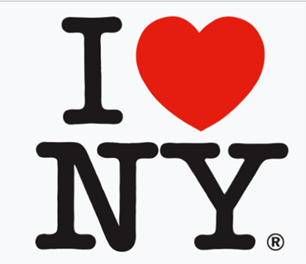The European General Court ruled in July 2025 that "I ♥" symbol cannot be registered as a trademark for clothing. Our Legal Trainee, Oskar Karelson, examined the decision, which emphasizes the most important characteristic of a trademark: distinctiveness.
The applicant for the trademark registration had attempted to obtain exclusive rights to a device mark consisting of the English word "I" and a heart symbol. In the final decision, it was determined that the mark does not meet the distinctiveness requirement for a trademark but serves only as a decorative element that generally symbolizes love and respect.

Origin of the "I ♥" symbol in New York State advertising
The widely recognized "I ♥" symbol has been in use since the 1970s in tourism marketing and later became widespread in clothing as well. It was originally designed for a New York State advertising campaign in 1976 by modifying small details to symbolize the city of New York. This logo quickly gained popularity, especially after the September 11 attacks, as it fostered a sense of unity among people.
However, the simplicity and similarity of logo versions became problematic, especially in the 2000s, when thousands of companies attempted to imitate it, and the cultural context also changed.

After September 11, 2001, "I ♥ NY" acquired a new, stronger symbolic value, and its commercial use increased as it could also be used as a sign of respect. However, monitoring the use of the logo became impossible, and the State of New York filed a total of 3,000 complaints in 2005.
The "I ♥" symbol lacks distinctiveness as a trademark
The European General Court confirmed the view that the symbol lacks sufficient distinctiveness and is a commonly used expression that conveys love or affection without indicating commercial origin. Placing the symbol on clothing, for example on the chest, collar, or sleeve, does not make it distinctive but remains a decorative element.
The decision emphasizes that no one should have exclusive rights to general symbols and that trademark applications should focus on unique and recognizable brand elements such as typography, color combinations, or graphic design.
The court's ruling highlights the practical challenge in trademark law. Granting exclusive rights to such a general symbol would make its enforcement practically impossible.
In clothing and consumer products, the heart symbol is so widely used that prohibiting its use by others would unreasonably restrict both freedom of expression and creativity. Ordinary consumers would continue to use products featuring "I ♥”, but liability for possible infringements would fall on manufacturers and retailers instead of individuals under the Finnish Trademark Act (2019/544). This would reduce the risk for end-users but simultaneously create uncertainty for companies that would have to fear lawsuits.
A trademark must be associated with a specific product or company
In summary, the decision to reject the registration of the "I ♥" symbol as a trademark reinforces the principle that trademark protection is only granted to distinctive marks. This increases the pressure on companies to build their own brand identity in ways that do not rely on generic expressions but instead create truly unique and recognizable marks.
The concept of distinctiveness is the key lesson and core in this case. A trademark can only be registered if it clearly directs the consumer to identify a specific commercial operator. Generic symbols, emotion-expressing patterns, and decorations do not meet this requirement.
Simple marks can only be protected through recognizability if they are universally identifiable by everyone. Examples include Apple's apple and Nike's "swoosh" logos. The "I ♥" symbol is well-known but cannot be associated with a specific product or company. In short, companies should strive to avoid situations where their 'own' symbol becomes widely used, with everyone using it in their own way and imagination.
Read more
What does trademark distinctiveness mean and why is it important?
